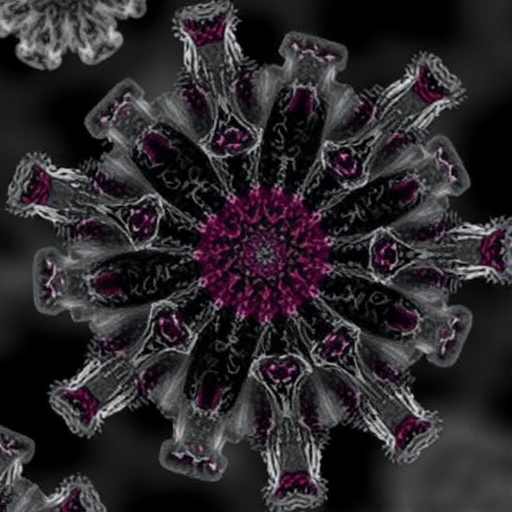In an era where the intricacies of cell metabolism and immune responses are being unraveled, new research has emerged that underscores the significance of natural compounds in modulating inflammatory pathways. The study in question, conducted by researchers Ren W., Yang Y., Duan H., and colleagues, investigates the inhibitory effects of flavonoids derived from the plant Pollen Typhae. Their findings pave the way for promising therapeutic strategies in managing inflammation-related disorders, particularly by targeting the NLRP3 inflammasome in macrophages. This intricate cellular mechanism plays a crucial role in immune response and inflammation, making it a focal point for therapeutic intervention.
The NLRP3 inflammasome is a complex of proteins found within immune cells that, when activated, leads to the production of pro-inflammatory cytokines. These cytokines are pivotal in the body’s response to injury and pathogen invasion. However, excessive activation of this inflammasome can result in chronic inflammatory diseases, making the discovery of modulators of its activity of paramount importance. The research highlights how flavonoids extracted from Pollen Typhae can inhibit this undesirable activation, presenting a viable pathway to modulate immune responses more effectively.
Flavonoids are known for their diverse pharmacological effects, including anti-inflammatory and antioxidant properties. The findings of this study contribute significantly to our understanding of how specific natural compounds can serve as potential agents for managing metabolic disorders and inflammatory diseases. The research meticulously outlines the biochemical pathways involved, particularly focusing on the role of AMP-activated protein kinase (AMPK) in lipid metabolism—a critical factor in maintaining cellular energy homeostasis.
Diving deeper into the mechanisms, the study presents how palmitic acid plays a pivotal role in promoting inflammatory responses through the activation of the NLRP3 inflammasome. By elucidating this link, the researchers provide a compelling narrative on the importance of dietary components, such as flavonoids, in counteracting metabolic stress induced by high levels of saturated fatty acids. The interplay between dietary flavonoids and cellular metabolism adds a new dimension to nutritional science, suggesting that dietary interventions could be a key strategy in managing chronic inflammation.
With a rigorous experimental design, the researchers conducted in vitro studies on macrophages exposed to palmitic acid, assessing the subsequent activation of the NLRP3 inflammasome in the presence of flavonoids from Pollen Typhae. The findings revealed a significant reduction in inflammasome activation alongside a downregulation of key pro-inflammatory cytokines. This observation not only supports the hypothesis that these flavonoids have a protective effect but also underlines their potential applications in clinical settings.
Another intriguing aspect of the study is the focus on AMPK, a crucial energy sensor within cells. The activation of AMPK serves as a potential link between flavonoid treatment and reduced inflammasome activation. By promoting lipid metabolism and enhancing mitochondrial function, AMPK acts to mitigate the inflammatory responses that could ensue from metabolic dysfunction. The findings suggest that flavonoids from Pollen Typhae may induce AMPK activation, thereby creating a cascade of beneficial effects that culminate in enhanced cellular health.
This research does not merely unveil another food compound with health benefits; it opens avenues for luxury and therapeutic formulations that can translate natural products into functional foods or even pharmaceuticals. As the quest for natural anti-inflammatory agents gains momentum, the integration of findings related to flavonoids and immune modulation could lead to the development of comprehensive treatment regimens for metabolic syndrome, obesity, and related diseases.
Furthermore, the implications of this research extend beyond individual health paradigms to encompass broader public health considerations. Chronic diseases, many of which are exacerbated by inflammation, pose a significant burden on healthcare systems worldwide. If flavonoids from natural sources like Pollen Typhae can be harnessed to mitigate these conditions, the resultant health benefits could be substantial and multi-dimensional.
In conclusion, the study presents essential insights into how natural extracts can influence cellular mechanisms and potentially steer a course towards improved health outcomes. As researchers continue to elucidate the pathways through which flavonoids exert their effects, the hope is that these findings can lead to innovative dietary strategies that enhance human health and longevity. The persistent quest for better health outcomes may well find its foundation in the wisdom of nature, guiding future research efforts in combating inflammation-related diseases through dietary interventions and natural product development.
The potential for future research is immense. Investigating the specific flavonoids responsible for the observed effects could lead to more targeted therapies. Moreover, exploring the synergy between various dietary components could create a comprehensive approach to inflammation management. The integration of molecular biology, nutrition science, and pharmacology is thus essential not only for advancing scientific knowledge but also for translating that knowledge into practical solutions for health challenges.
Ultimately, the findings surrounding the inhibitory effects of flavonoids extracted from Pollen Typhae represent a promising development in the ongoing exploration of natural strategies to enhance health. Researchers and healthcare providers alike stand at a threshold where traditional medicine meets modern scientific inquiry, suggesting an exciting trajectory for disease prevention and management strategies.
By continuing to delve into the molecular dynamics at play, the scientific community can foster innovations that resonate with both the principles of health and the realities of modern living, bridging the gap between nature’s offerings and human health requirements.
Subject of Research: Inhibitory effects of flavonoids from Pollen Typhae on NLRP3 inflammasome activation in macrophages.
Article Title: Inhibitory effects of the flavonoids extracted from Pollen Typhae on palmitic acid-induced NLRP3 inflammasome activation in macrophages involving AMPK-mediated lipid metabolism.
Article References:
Ren, W., Yang, Y., Duan, H. et al. Inhibitory effects of the flavonoids extracted from Pollen Typhae on palmitic acid-induced NLRP3 inflammasome activation in macrophages involving AMPK-mediated lipid metabolism. BMC Complement Med Ther 25, 315 (2025). https://doi.org/10.1186/s12906-025-05024-4
Image Credits: AI Generated
DOI: 10.1186/s12906-025-05024-4
Keywords: Flavonoids, Pollen Typhae, NLRP3 inflammasome, AMPK, Inflammation, Metabolism, Macrophages, Chronic disease, Natural compounds, Immune response.




